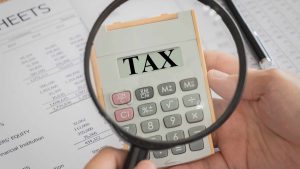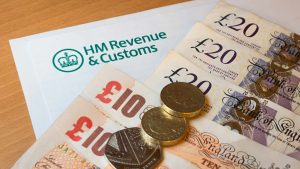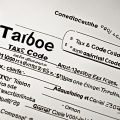Last Updated on: 2nd April 2024, 11:29 am
Are you a UK taxpayer puzzled by the mysterious D0 tax code on your payslip? Wondering what it means and how it affects your earnings? Look no further! In this blog post, we’ll dive deep into the world of Tax Code D0 – unraveling its secrets, understanding its impact, and exploring everything you need to know as a taxpayer. Let’s demystify the D0 tax code together!
The D0 tax code can have a significant impact on UK taxpayers depending on their income level and circumstances. For basic rate taxpayers, having the D0 tax code means all of their income is taxed at 40%, potentially resulting in higher deductions from each paycheck. Higher rate taxpayers facing the D0 code may experience even greater reductions in their take-home pay due to the 45% taxation rate.
Understanding the implications of the D0 tax code is crucial for individuals to properly manage their finances and plan accordingly. It’s important to be aware of your tax situation and seek guidance if you’re unsure about how this specific tax code affects you.
Whether you’re a basic or higher-rate taxpayer, navigating the complexities of the D0 tax code requires attention to detail and proactive financial planning. Stay informed about any changes to your tax status that may impact your overall earnings throughout the year.
What is a D0 Tax Code?

Have you ever come across the mysterious D0 tax code on your payslip and wondered what it means? Well, let’s shed some light on this enigmatic combination of letters and numbers.
A D0 tax code is a specific code used by HM Revenue & Customs (HMRC) to indicate that all your income from that job is being taxed at a higher rate. It essentially means you’re not entitled to any personal allowance for that particular source of income.
The ‘D’ in the code stands for ‘higher rate’ while the ‘0’ indicates no allowances are being applied against your earnings. This could be due to various reasons like having multiple sources of income or not providing accurate information to HMRC regarding your earnings. So, if you see a D0 tax code, it’s time to investigate further into why it has been assigned to you.
How to Identify If You Have the D0 Tax Code?
If you’re wondering if the D0 tax code applies to you, there are a few ways to identify it. The easiest method is to check your payslip – the tax code should be displayed. Another way is through correspondence from HMRC, where they inform you of any changes in your tax code.
You can also log into your tax account online or contact HMRC directly for clarification. If you’ve recently started a new job or have multiple income sources, it’s essential to double-check your tax code to ensure accuracy.
Keep an eye out for any letters regarding a change in your tax code or speak with your employer’s payroll department. Being proactive and staying informed about your tax affairs can help prevent any surprises down the line.
Impact of the D0 Tax Code on UK Taxpayers
The D0 tax code can have varying impacts on UK taxpayers depending on their income levels. For basic rate taxpayers, having a D0 tax code means all their earnings are taxed at the higher rate from the first pound earned. This could lead to a significant reduction in take-home pay and potential financial challenges.
On the other hand, for higher rate taxpayers, already accustomed to paying more in taxes, the impact of a D0 tax code might not be as drastic. However, it can still result in increased taxation overall due to the higher rates applied across all income.
For individuals affected by this tax code, careful financial planning becomes essential to navigate any potential budget constraints or unexpected changes in disposable income. It’s crucial for taxpayers to understand why they have been assigned a D0 tax code and explore ways to rectify it if necessary through HMRC communication or seeking professional advice.
How to Change My D0 Tax Code?

Have you found yourself in a situation where your D0 tax code needs to be changed? Don’t worry; the process is relatively straightforward. To change your D0 tax code, you need to contact HM Revenue and Customs (HMRC) either by phone or through their online portal.
Before reaching out, ensure you have all the necessary information at hand, such as your National Insurance number and details of any income sources. This will help expedite the process and ensure accuracy when updating your tax code.
When speaking with HMRC, clearly explain why you believe your D0 tax code needs adjusting. Whether it’s due to changing employment circumstances or other factors impacting your tax status, providing clear reasoning can assist in swiftly resolving the issue.
Remember that changes to your tax code may take some time to reflect in your pay, so it’s essential to stay informed about the progress of your request. By staying proactive and communicative with HMRC, you can ensure that any necessary adjustments are made promptly.
Causes for a Change to the D0 Tax Code
When it comes to the D0 tax code, there are various reasons why you might see a change in your tax status. One common cause is transitioning from one employment situation to another, such as moving from full-time to part-time work or starting a new job altogether.
Additionally, changes in your income level can trigger a switch to the D0 tax code. If your earnings increase significantly or decrease below a certain threshold, HMRC may adjust your tax code accordingly.
Life events like getting married or having children could also prompt a change to the D0 tax code. These milestones often come with adjustments in financial circumstances that HMRC takes into account when determining your tax obligations.
Furthermore, if you start receiving additional sources of income outside of regular employment, such as rental properties or investments, this could lead to a shift towards the D0 tax code. It’s essential to keep HMRC informed about any changes that could impact your taxation status.
Exploring Variants of the D0 Tax Code (D0 M1, D0 1, D0 W1, D0 X, D0 Cumul, D0 Noncum)
Exploring the different variants of the D0 tax code can provide valuable insights into how HMRC calculates your tax obligations.
The D0 M1 variant is used for individuals with multiple employments, ensuring each job deducts taxes correctly without under or overcharging you. On the other hand, D0 1 may indicate a coding notice issued manually by HMRC.
For those working irregular hours or on a weekly pay schedule, the D0 W1 variant adjusts your tax accordingly to reflect these fluctuations in earnings. Meanwhile, the D0 X code signifies that all income from that specific job should be taxed at a higher rate.
Diving deeper into variations like D0 Cumul and D0 Noncum sheds light on whether your tax calculations are cumulative throughout the year or non-cumulative per pay period, impacting how much you owe in taxes regularly.
Application of the D0 Tax Code to Second Jobs
Are you considering taking on a second job? If so, understanding how the D0 tax code applies to additional income is crucial. When you have more than one job, HMRC may allocate the D0 tax code to your secondary employment. This means all earnings from this job will be taxed at a higher rate.
It’s essential to keep track of your multiple income sources and ensure that both employers are using the correct tax codes. Failing to do so could result in underpayment or overpayment of taxes. Remember that it’s your responsibility to inform HMRC about any changes in your circumstances promptly.
Having a second job can impact not only your overall earnings but also how much tax you owe. Make sure to stay informed and seek advice if needed when navigating multiple sources of income with different tax implications.
Handling Errors with the D0 Tax Code

Encountering errors with your tax code can be a frustrating experience, especially if you’re dealing with the D0 code. These errors may arise due to various reasons, such as incorrect information provided by your employer or changes in your employment status that haven’t been updated.
If you notice discrepancies in your tax deductions or suspect an error with your D0 tax code, it’s crucial to address them promptly. Contacting HMRC or seeking advice from a tax professional can help rectify any issues and prevent further complications down the line.
Be proactive in monitoring your pay stubs and ensuring that the correct tax code is being applied to avoid potential financial implications. Remember, accuracy is key when it comes to handling errors related to the D0 tax code.
Addressing Emergency Tax Code Concerns
Facing an emergency tax code can be daunting, but it’s crucial to address the issue promptly. If you find yourself on an emergency tax code, don’t panic; there are steps you can take to rectify the situation. First and foremost, contact HMRC immediately to clarify why you’ve been placed on this temporary code. Providing them with accurate information will help expedite the process of getting your correct tax code reinstated.
It’s essential to keep all relevant documents handy when reaching out to HMRC so that they have a comprehensive understanding of your tax status. Additionally, staying proactive and following up with HMRC ensures that your case is being dealt with efficiently. Remember, resolving emergency tax concerns promptly can prevent any unnecessary overpayments or underpayments in taxes.
By taking swift action and communicating effectively with HMRC, you can swiftly resolve any issues related to emergency tax codes and ensure that your taxes are calculated accurately going forward.
Could I be Due a Tax Rebate?
Are you wondering if you could be in line for a tax rebate? The possibility of receiving some extra money back from the HMRC is always exciting. Whether it’s due to overpaid taxes or changes in your circumstances, there are various reasons why you might be eligible for a tax refund.
Perhaps you’ve switched jobs, had multiple income sources, or made charitable donations that qualify for tax relief. These factors can impact whether you’re entitled to a rebate. It’s essential to keep track of your finances and any changes throughout the year.
Filing your taxes accurately and on time increases the chances of spotting any discrepancies that could lead to a potential refund. Checking your tax code regularly can also help identify if there have been any errors affecting your payments.
If you suspect you might be due a tax rebate, it’s advisable to reach out to HMRC or consult with a financial advisor for guidance on how best to proceed. Remember, every taxpayer’s situation is unique, so it’s worth investigating further if there’s a chance you could reclaim some of your hard-earned money.
Impact on Earnings

When it comes to the impact of the D0 tax code on your earnings, it’s essential to understand how it influences your take-home pay. The D0 tax code typically means that all your income is taxed at a higher rate, which can significantly reduce the amount you receive in your paycheck each month.
For basic rate taxpayers, having a D0 tax code could mean losing more of your hard-earned money to taxes than necessary. This can affect your budgeting and financial planning, making it crucial to stay informed about any changes in your tax code.
Higher rate taxpayers facing a D0 tax code may experience even greater deductions from their earnings. It’s important to monitor these changes closely and seek advice if needed to ensure you’re managing your finances effectively.
Understanding how the D0 tax code impacts your earnings is key to staying on top of your finances and making informed decisions about managing your income.
Tax Code Comparisons D0 vs. BR
When it comes to understanding tax codes, the comparison between D0 and BR can be crucial for UK taxpayers. The D0 tax code is often assigned to individuals who have multiple sources of income or specific circumstances that require higher withholding rates. On the other hand, the BR tax code is commonly used for individuals with only one job at a basic rate.
The key difference lies in how much of your income is subject to taxation upfront. With a D0 tax code, more of your earnings will be taxed initially compared to the BR code. This can impact your take-home pay significantly depending on your total income and tax situation.
It’s essential to know which tax code applies to you as it directly affects how much you owe in taxes throughout the year. Understanding these distinctions can help you plan better financially and avoid any surprises come tax season.
When should I Contact the HMRC About My Tax Code?

If you notice that your tax code is incorrect, it’s crucial to contact HMRC promptly. Errors can lead to overpaying or underpaying taxes. Keep an eye out for any discrepancies in your tax documents and payslips. If you’ve started a new job or have multiple income sources, it’s wise to ensure all details are accurately reflected in your tax code.
Changes in personal circumstances like marriage, divorce, or moving abroad may also require a review of your tax code. It’s better to address issues proactively rather than dealing with potential financial repercussions later on. Contacting HMRC can help resolve any uncertainties about the D0 tax code and prevent future complications.
HMRC provides assistance through various channels like phone calls, online inquiries, and even face-to-face appointments if necessary. Don’t hesitate to reach out when in doubt about your tax situation – clarity is key when it comes to managing your finances efficiently and effectively.
Conclusion
In understanding the D0 tax code and its implications, UK taxpayers can navigate their tax obligations more effectively. Whether you find yourself with a D0 tax code due to non-taxpayer status, student or retirement circumstances, it is essential to comprehend how this impacts your earnings. Remember that changes or errors in your tax code can influence your income significantly.
By staying informed about the D0 tax code variations, knowing when to contact HMRC for assistance, and being proactive in addressing any issues that arise, you can ensure compliance with UK taxation laws while optimizing your financial situation. Stay updated on any updates regarding the D0 tax code and be proactive in managing your taxes for a smoother financial journey ahead.




















No Comments
Leave a comment Cancel